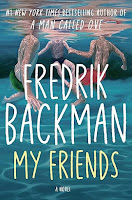My Friends by Fredrik Backman is a lovely novel that features the characters of Joar, Ali, Ted, KimKim (the artist), and Louisa. Also important to the story are Christian (a twenty year old budding artist and school janitor) and his mom (an art teacher at a university).
The book begins with a meeting between the artist as an adult in the final days of his life and Louisa as a just turned eighteen year old orphan who has recently lost her best friend. It then turns into a journey by Ted and Louisa, with Ted telling the story of the childhood friendship shared twenty-five years prior by Joar, Ali, Ted and the artist.
A central part of the story is a famous painting done by the artist (known as C. Jat, the initials of Christian and his friends), with The One of the Sea his first work when he fourteen years old and including his three friends as tiny figures in the painting. Backman writes very well about connections and My Friends covers friendship, finding your people ("one of us"), and life coming full circle. The four were damaged souls from difficult homes who found each other. They grow to share a language with each other, including "Here!" "Tomorrow!" and "I love you and I believe in you."
Joar was focused on the artist becoming a successful painter so he could escape their town and his difficult life. The start of the artist's painting career was also triggered by meeting Christian, who said to paint like the birds sing and the best art is painting not what you see, but what you feel. Later, the artist would describe his work as painting the way his friends laughed. When the four friends were young, they broke into a museum and hung The One of the Sea on the wall, which brought Christian's mother into their lives, and would become circled back on at the end. One thing about the the book is it feels at times to be going a direction, then surprises you.

















